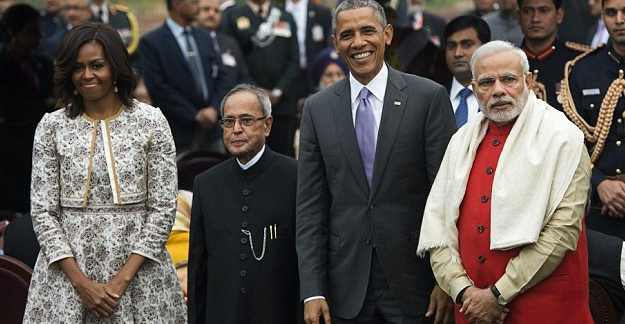On Eve of PM Modi US Visit Senators Express "Deep" Worry About Religious Intolerance in India

NEW DELHI: It is not going to be a cakewalk for Prime Minister Narendra Modi who will be in the United States for a second bilateral for a ‘working visit’ with US President Barack Obama. The Prime Minister was denied a state visit, despite considerable effort by the Indian Foreign Office, and had to finally settle for a working dialogue that will focus on hard issues and not be diverted by atmospherics and chemistry.
A major issue of concern before the US State Department is religious bigotry and intolerance in India. Assistant Secretary of State for South and Central Asian Affairs Nisha Desai Biswal was quizzed at length less than two days ago by the Senate Foreign Relations Committee. Several Senators expressed deep concern about rising religious intolerance in India, and sought an assurance that the US State Department that it was taking this up with the Modi government. Biswal repeatedly assured the Senators that the Obama Administration was well aware of these issues, was as concerned, and had been taking them at the highest level with India. “We are always looking for new ways to partner with India to advance human rights, strengthen democratic institutions, and support societies that are more inclusive, secular, and tolerant,” she said.
This is unusual on the eve of a Prime Ministerial visit, and is clearly part of the pressure being felt by the Obama administration from Senators who voiced strong concerns on religious intolerance, women trafficking and as one of them said “slaves” in India. Biswal was quizzed by Senators at some length on religious intolerance. Virginia Senator Tim Kaine was particularly concerned and referring to the return of awards by writers and artists, said that he would raise this with PM Modi in Washington. Maryland Senator Ben Cardin, a ranking member of the committee, was also perturbed about what he described as rising levels of religious intolerance in India and joined others in questioning New Delhi’s decision to deny visas to members of the US Commission on International Religious Freedom.
Cardin said that anti-conversion laws in some Indian states were “problematic”. Biswal agreed with the Senators and assured them that these had been raised, and were being raised, by the Obama administration at the highest level. She added interestingly that “there is no more robust voice than the voice of the Indian people that is taking up these issues with increasing vigour and public debate.” This was echoed by other Senators who spoke highly of civil society efforts to curb the intolerance trend.
Cardin was categorical“We are concerned about the attack on civil society within India. They have to be effectively be able to speak. (But) it does not relieve us from developing and working with leaders in India that recognise that these are not western values, these are universal issues that India needs to make progress on.” The last was clearly a reference to the argument by the right that secularism is a western concept.
The recent report of the Religious Freedom Commission was taken up by Senators, even as they commended India’s “vibrant civil society” for raising the issues. Senators raised the issue of denial of visas to the members of the Commission to which Biswal said that the US Administration had tried to persuade the Indian government but to no avail.
Senator Kaine was worried about the deterioration of religious freedom in India. Senator Gardner spoke of civil society organisations being harassed by the Modi government.”This is of deep concern to me,” he said. Giving a specific example he said, “In India Compassion International (Colorado based) has been sued by the Income Tax four times. Their assets have been seized. They have had their employees and church pastors interrogated for hours by intelligence bureau. Twelve separate visa applications have been denied.”
Biswal repeatedly sought to assure the Senators that the Obama Administration was working hard on all these fronts. “One of the concerns that we have raised with our counterparts in India is the regulatory and legal framework that seeks to constrain the activities of the civil society organisations, whether they be Indian or international organisations. This is a continuing area of concern.”
Cardin said that India was inconsistent in the way it treated women. He was categorical and hard when he said, “So tell us the progress being made in dealing with slavery in our relationship with India. This is democratically, a friend. Are we being candid with them with regard to trafficking.“ Biswas assured him that the issue was being taken up with the Indian government. And she admitted, “but there is a long way to go. It would be increasingly incumbent upon India to advance the rule of law to all aspect of the society.” Here Biswas admitted, “We do think that there is a lot more that can and should be done to address issues of trafficking and child labour.”
Chairman of the Senate Foreign Relations Committee Senator Bob Corker raised yet another issue of concern, on what he described as slavery in India. “India has 12-14 million slaves. There are 27 million slaves in the world. How does a country like this has 12-14 million slave in the year 2016? How does that happen?” he wanted to know.
These concerns articulated at some length by influential Senators does ensure that the issues of religious bigotry and intolerance will be part of the talks during this working visit. Biswal has spelt out a US Department wish list which includes the Logistics Support Agreement but the Commissions report on the rise of extremism in India, and the Senators interventions on this as well as girl trafficking and “slavery” will require the US State Department to get answers to some of the hard questions from the visiting Indian Prime Minister.



